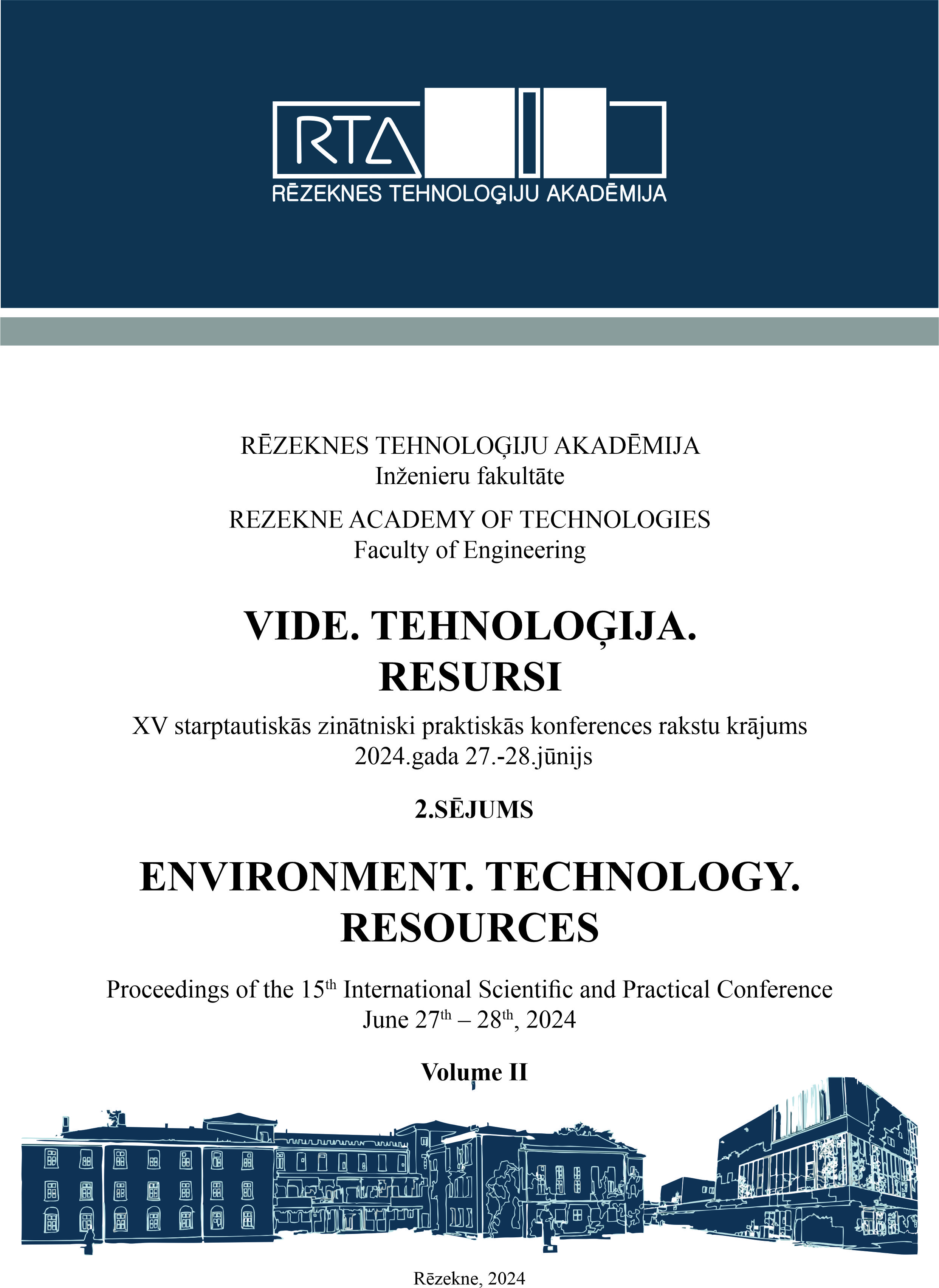EXPLORING COMPUTER ENGINEERING AND INFORMATION TECHNOLOGY UNDERGRADUATES’ VIEWS ON DEVELOPING THEIR INNOVATIVE THINKING IN ENGLISH CLASSROOM
DOI:
https://doi.org/10.17770/etr2024vol2.8096Keywords:
Computer Engineering and Information Technology undergraduates, English classroom, innovative teaching and learning methods and techniques, innovative thinkingAbstract
In our modern world, which is full of technological advancements, being able to think innovatively is essential for coping successfully with life and work challenges. For specialists who are going to work in the field of Computer Engineering and Information Technology innovative thinking is an ability that helps them adapt quickly to new challenges and opportunities and find non-standard solutions to various issues. In the study the researchers focused on finding out effective teaching and learning methods and techniques which can be used in the English language classroom for developing innovative thinking among Computer Engineering and Information Technology undergraduates. Considering the fact that the researchers are the English language teachers, to select the research sample they used a combination of a purposive sampling technique and a convenience sampling technique. To gather data on Computer Engineering and Information Technology undergraduates’ views on developing their innovative thinking in the English Language classroom the researchers created a web-based questionnaire using Google Forms. The link to the questionnaire was distributed to the first- and second-year Computer Engineering and Information Technology students who study English as a second language at Kyiv National University of Technologies and Design. The results obtained enabled the researchers to identify teaching and learning methods and techniques effective for developing innovative thinking among Computer Engineering and Information Technology undergraduates.
References
M. Caeiro-Rodríguez et al., “Teaching Soft Skills in Engineering Education: An European Perspective,” IEEE Access, vol. 9, pp. 29222-29242, February 15, 2021. [Online]. Available: https://ieeexplore.ieee.org/document/9354626 [Accessed: Dec. 19, 2023], 10.1109/ACCESS.2021.3059516
World Economic Forum, “These are the top 10 job skills of tomorrow – and how long it takes to learn them”, World Economic Forum, 2020. [Online]. Available: https://www.weforum.org/agenda/2020/10/top-10-work-skills-of-tomorrow-how-long-it-takes-to-learn-them/ [Accessed: Oct. 22, 2023].
O. Malykhin, N. Aristova, N. Dichek, and N. Dyka, “Formation of Top Job Skills of Tomorrow Among Computer Engineering and Information Technologies Undergraduate Students in the Process of Learning English,” In Proc. ETR International Scientific and Practical Conference, vol. 2, pp. 249-254, 2021, https://doi.org/10.17770/etr2021vol2.6642
R. B. Ness, “Promoting innovative thinking,” Am J Public Health”, vol. 105 Suppl 1(Suppl 1):S114-8, 2015 Mar. [Online]. Available: National Library of Medicine, https://www.ncbi.nlm.nih.gov/pmc/articles/PMC4340012/ [Accessed: Dec. 1, 2023], 10.2105/AJPH.2014.302365
R. B. Ness, “Promoting innovative thinking,” Am J Public Health”, vol. 105 Suppl 1(Suppl 1):S114-8, 2015 Mar. [Online]. Available: National Library of Medicine, https://www.ncbi.nlm.nih.gov/pmc/articles/PMC4340012/ [Accessed: Dec. 1, 2023], 10.2105/AJPH.2014.302365
M. Dunlop, “Innovative Thinking: Why It’s The Skill of The Future, ” December 2020. [Online]. Available: https://www.viima.com/blog/innovative-thinking [Accessed: Nov. 12, 2023].
J. Wang and Y. Zhu, “The Cultivation of Students’Innovative Thingking Ability in the College English Teaching,” In Proc. 2015 International Conference on Social Science, Education Management and Sports Education (SSEMSE 2015), 2015, pp. 1842-1844. [Online]. Available: https://www.atlantis-press.com/article/25842444.pdf [Accessed: Sept. 25, 2023].
J. Wang and Y. Zhu, “The Cultivation of Students’Innovative Thingking Ability in the College English Teaching,” In Proc. 2015 International Conference on Social Science, Education Management and Sports Education (SSEMSE 2015), 2015, pp. 1842-1844. [Online]. Available: https://www.atlantis-press.com/article/25842444.pdf [Accessed: Sept. 25, 2023].
Q. Zhang, “Cultivation of College Students’ Innovation Thinking in English Under the Idea of Wisdom Education,” In Proc. 2020 International Conference on Modern Education Management, Innovation and Entrepreneurship and Social Science (MEMIESS 2020), vol. 523, pp. 135-138, 2020. [Online]. Available: https://www.researchgate.net/publication/353305160_Cultivation_of_College_Students'_Innovation_Thinking_in_English_Under_the_Idea_of_Wisdom_Education [Accessed: Feb 25, 2024].
Q. Zhang, “Cultivation of College Students’ Innovation Thinking in English Under the Idea of Wisdom Education,” In Proc. 2020 International Conference on Modern Education Management, Innovation and Entrepreneurship and Social Science (MEMIESS 2020), vol. 523, pp. 135-138, 2020.
F. Cai, “Cultivation of Innovative Thinking Ability in English Reading Teaching,” presented at 3rd International Conference on Education Technology and Information System (ETIS 2020), 2020, pp. 218-222. [Online]. Available: http://166.62.7.99/conferences/AETP/ETIS%202020/ETIS2020042.pdf [Accessed: Nov. 12, 2023].
F. Cai, “Cultivation of Innovative Thinking Ability in English Reading Teaching,” presented at 3rd International Conference on Education Technology and Information System (ETIS 2020), 2020, pp. 218-222. [Online]. Available: http://166.62.7.99/conferences/AETP/ETIS%202020/ETIS2020042.pdf [Accessed: Nov. 12, 2023].
O. Malykhin, N. Aristova, N. Dichek, and N. Dyka, “Formation of Top Job Skills of Tomorrow Among Computer Engineering and Information Technologies Undergraduate Students in the Process of Learning English,” In Proc. ETR International Scientific and Practical Conference, vol. 2, pp. 249-254, 2021, https://doi.org/10.17770/etr2021vol2.6642
K. Kugai and M. Vyshnevska, “Peculiarities of teaching foreign languages to computer specialties students”, Baltic Journal of Legal and Social Sciences, vol. 3, pp. 93-100, October, 2023. [Online serial]. Available: http://baltijapublishing.lv/index.php/bjlss/article/view/2170. [Accessed Dec.12, 2023], https://doi.org/10.30525/2592-8813-2023-3-12
O. Malykhin, N. Aristova, and S. Melikova, “Soft Skills Development Strategies for Computer Engineering and Information Technologies Undergraduate Students Devised in the Process of Learning English,” In Proc. ETR International Scientific and Practical Conference, vol. 2, pp. 255-260, 2021, https://doi.org/10.17770/etr2021vol2.6602
O. Malykhin, N. Aristova, and S. Melikova, “Soft Skills Development Strategies for Computer Engineering and Information Technologies Undergraduate Students Devised in the Process of Learning English,” In Proc. ETR International Scientific and Practical Conference, vol. 2, pp. 255-260, 2021, https://doi.org/10.17770/etr2021vol2.6602
Downloads
Published
Issue
Section
License
Copyright (c) 2024 Oleksandr Malykhin, Nataliia Aristova, Maryna Vyshnevska, Kseniia Kugai, Inna Makhovych

This work is licensed under a Creative Commons Attribution 4.0 International License.



